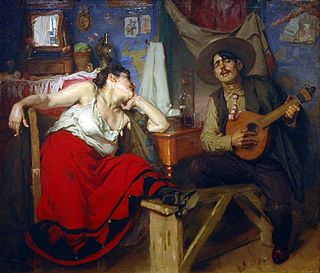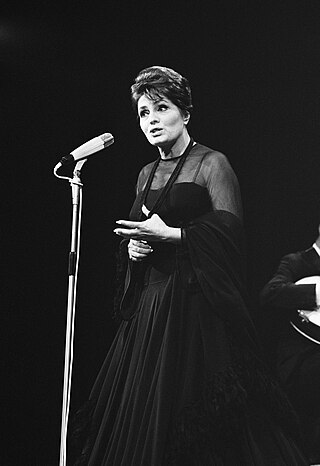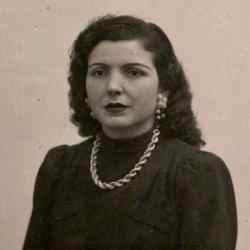
Fado is a music genre which can be traced to the 1820s in Lisbon, Portugal, but probably has much earlier origins. Fado historian and scholar Rui Vieira Nery states that "the only reliable information on the history of fado was orally transmitted and goes back to the 1820s and 1830s at best. But even that information was frequently modified within the generational transmission process that made it reach us today."
This is a list of music-related events in 1820.

Portuguese music includes many different styles and genres, as a result of its history. These can be broadly divided into classical music, traditional/folk music and popular music and all of them have produced internationally successful acts, with the country seeing a recent expansion in musical styles, especially in popular music.

Marisa dos Reis Nunes, known professionally as Mariza, is a Portuguese fado singer.

Amália da Piedade Rebordão Rodrigues, known as simply Amália Rodrigues or popularly as Amália, was a Portuguese fado singer (fadista).

Madredeus are a Portuguese musical ensemble formed in 1985, in Lisbon. Their music combines traditional Portuguese music, fado and folk music.

Dulce José Silva Pontes is a Portuguese songwriter and singer who performs in many musical styles, including pop, folk, and classical music. She is usually defined as a world music artist. Her songs contributed to the 1990s revival of Portuguese urban folk music called fado.

A Canção de Lisboa is a 1933 Portuguese musical comedy film, directed by José Cottinelli Telmo, and starring Vasco Santana, Beatriz Costa, António Silva, Alfredo Silva, Ana Maria, Artur Rodrigues, Coralia Escobar, Eduardo Fernandes, Elvira Coutinho, Fernanda Campos, Francisco Costa, Henrique Alves, Ivone Fernandes, José Victor, Júlia da Assunção, Manoel de Oliveira, Manuel Santos Carvalho, Maria Albertina, Maria da Luz, Silvestre Alegrim, Sofia Santos, Teresa Gomes and Zizi Cosme.

A Severa is a 1931 Portuguese film directed by Leitão de Barros. It's famous for being the first Portuguese talking film. It is a biopic of the fado singer Maria Severa Onofriana, known as A Severa, based on the play by Júlio Dantas.

D. Maria Teresa do Carmo de Noronha, was a Portuguese aristocrat and a fado singer. As a granddaughter of the Counts of Paraty and Belmonte, she belonged to a family of the most ancient Nobility in the Iberian Peninsula, tracing her roots to the Royal Houses of both Portugal and Castile from the mid-14th century. Her artistic career spanned over 30 years and hers is considered one of the most unusual and beautiful fado voices. Her status as a fidalga meant, in the context of a conservative early 20th century Portugal, that she faced severe restrictions in having a professional artistic career. As such, she did not enjoy the projection of other great fadistas of her time.

Katia Guerreiro is a South African-born Portuguese fado singer, who has released eight albums and has received several awards, including Order of Arts and Letters, Chevalier rank, from the French government and the Order of Prince Henry from the President of Portugal.

Anabela Braz Pires is a Portuguese singer and musical theatre actress, best known in Portugal by her first name, Anabela.

Sonia Shirsat is an Indian fadista. Referred to as the "ambassador of Goan music to the world" she has performed across India and the world and often during cultural and music events in Goa. She has sung in 15 different languages Shirsat has been promoting Fado in Goa, by holding training and introductory classes to this form of music at various parts of the region.

Júlio Resende is a Portuguese pianist and composer. He is a pioneer of a unique and new genre called "Fado-Jazz". His improvisation techniques are transversal to his aesthetics, and articulate different musical genres, from Jazz, Fado, Classical Music and even Electronic Music.
Lucília Nunes de Ascensão do Carmo was a Portuguese fadista and the mother of Carlos do Carmo.
Alto de São João Cemetery is the largest cemetery in Lisbon, Portugal, located in the freguesia of Penha de França, in eastern Lisbon.

Maria Sidónio Baracho Damião was a Portuguese actress, singer, and ceramicist.

Maria do Carmo Fontes Páscoa Bernardo, better known as Maria do Carmo, was a popular Portuguese fado singer in Lisbon and Brazil.

Ercília Botelho Farinha Costa, known as Ercília Costa, was a Portuguese revue actress and composer and the first internationally renowned fado singer.
















